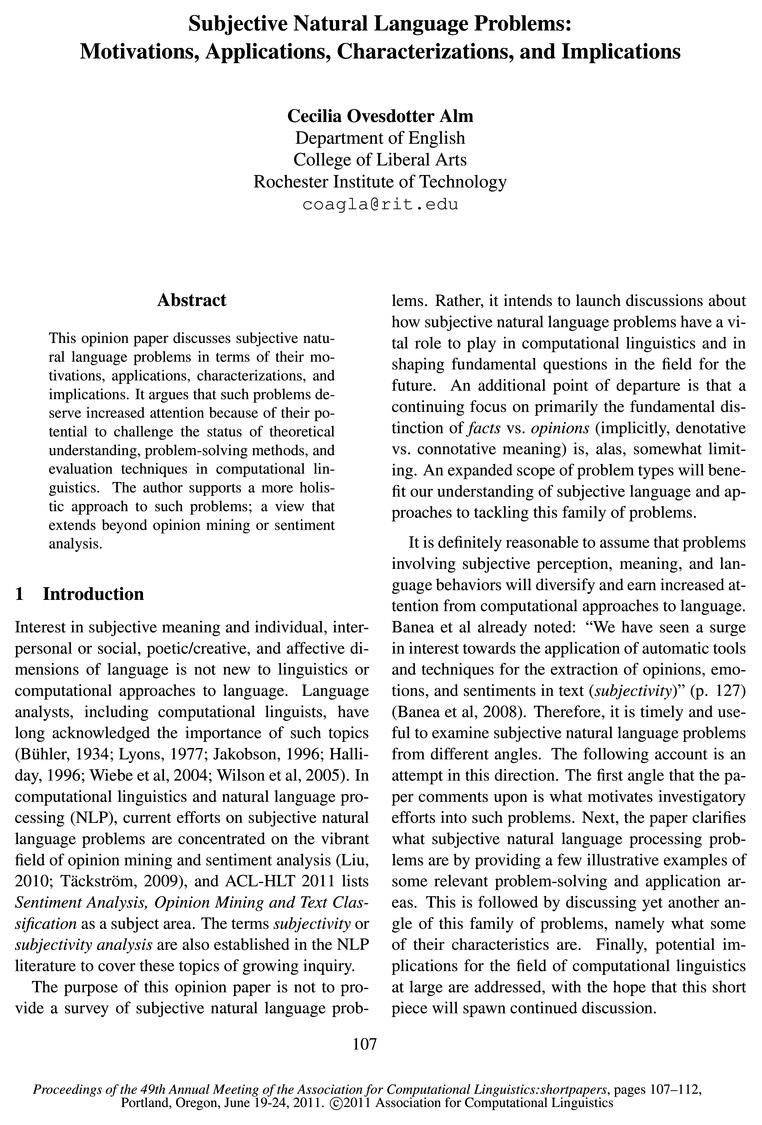Article Structure
Abstract
This opinion paper discusses subjective natural language problems in terms of their motivations, applications, characterizations, and implications.
Introduction
Interest in subjective meaning and individual, interpersonal or social, poetic/creative, and affective dimensions of language is not new to linguistics or computational approaches to language.
Motivations
The types of problems under discussion here are fundamental language tasks, processes, and phenomena that mirror and play important roles in people’s daily social, interactional, or affective lives.
Applications
Subjective natural language problems extend well beyond sentiment and opinion analysis.
Characterizations
It must be acknowledged that a problem such as inferring affective meaning from text is a substantially different kind of ‘beast’ compared to predicting, for example, part-of-speech tags.1 Identifying such problems and tackling their solutions is also becoming increasingly desirable with the boom of personalized, user-generated contents.
Implications
The cases discussed above in section 3 are just selections from the broad range of topics involving aspects of subjectivity, but at least they provide glimpses at What can be done in this area.
Conclusion
To conclude: there is a strong potential—or, as this paper argues, a necessity—to expand the scope of computational linguistic research into subjectivity.
Topics
natural language
- This opinion paper discusses subjective natural language problems in terms of their motivations, applications, characterizations, and implications.Page 1, “Abstract”
- In computational linguistics and natural language processing (NLP), current efforts on subjective natural language problems are concentrated on the vibrant field of opinion mining and sentiment analysis (Liu, 2010; Tackstrom, 2009), and ACL-HLT 2011 lists Sentiment Analysis, Opinion Mining and Text Classification as a subject area.Page 1, “Introduction”
- The purpose of this opinion paper is not to provide a survey of subjective natural language prob-Page 1, “Introduction”
- Rather, it intends to launch discussions about how subjective natural language problems have a vital role to play in computational linguistics and in shaping fundamental questions in the field for the future.Page 1, “Introduction”
- Therefore, it is timely and useful to examine subjective natural language problems from different angles.Page 1, “Introduction”
- Next, the paper clarifies what subjective natural language processing problems are by providing a few illustrative examples of some relevant problem-solving and application areas.Page 1, “Introduction”
- Subjective natural language processing problems represent exciting frontier areas that directly relate to advances in artificial natural language behavior, improved intelligent access to information, and more agreeable and comfortable language-based human-computer interaction.Page 2, “Motivations”
- From a practical, application-oriented point of View, dedicating more resources and efforts to subjective natural language problems is a natural step, given the wealth of available written, spoken or multimodal texts and information associated with creativity, socializing, and subtle interpretation.Page 2, “Motivations”
- Subjective natural language problems extend well beyond sentiment and opinion analysis.Page 2, “Applications”
- Affective semantics is difficult for many automatic techniques to capture because rather than simple text-derived ‘surface’ features, it requires sophisticated, ‘deep’ natural language understanding that draws on subjective human knowledge, interpretation, and experience.Page 2, “Applications”
- 0 Nontraditional intersubjectivity Subjective natural language processing problems are generally problems of meaning or communication where so-called intersubjective agreement does not apply in the same way as in traditional tasks.Page 3, “Characterizations”
See all papers in Proc. ACL 2011 that mention natural language.
See all papers in Proc. ACL that mention natural language.
Back to top.

